Santos Gox squints into the beating sun, eyes narrowing in concentration as he psyches himself up for the task at hand. With his focused gaze, he looks like he could be lining up a free throw, but Gox isn’t shooting hoops. His gaze is fixed on the face that bobs and weaves in front of him.
“Smash him!” shouts the crowd as the pair circle each other, arms swinging wildly. The dull crunch of breaking cartilage cuts through the noise as fist meets nose. Blood streaming, fists flying, it sounds like it could be a bar brawl. It’s not; Gox is fighting at a bare-knuckle boxing festival in the town of Chivarreto, Guatemala.
The fight doesn’t last long, but the intense effort makes the boxers’ blood-spattered chests heave with exertion as they descend from the ring. “Vamos Chivarreto,” shouts the victorious Gox, 24, holding his battered knuckles aloft in celebration. In this remote corner of Central America, you box without gloves. But how did the tradition come about and what is it that motivates fighters like Gox to step into the ring?
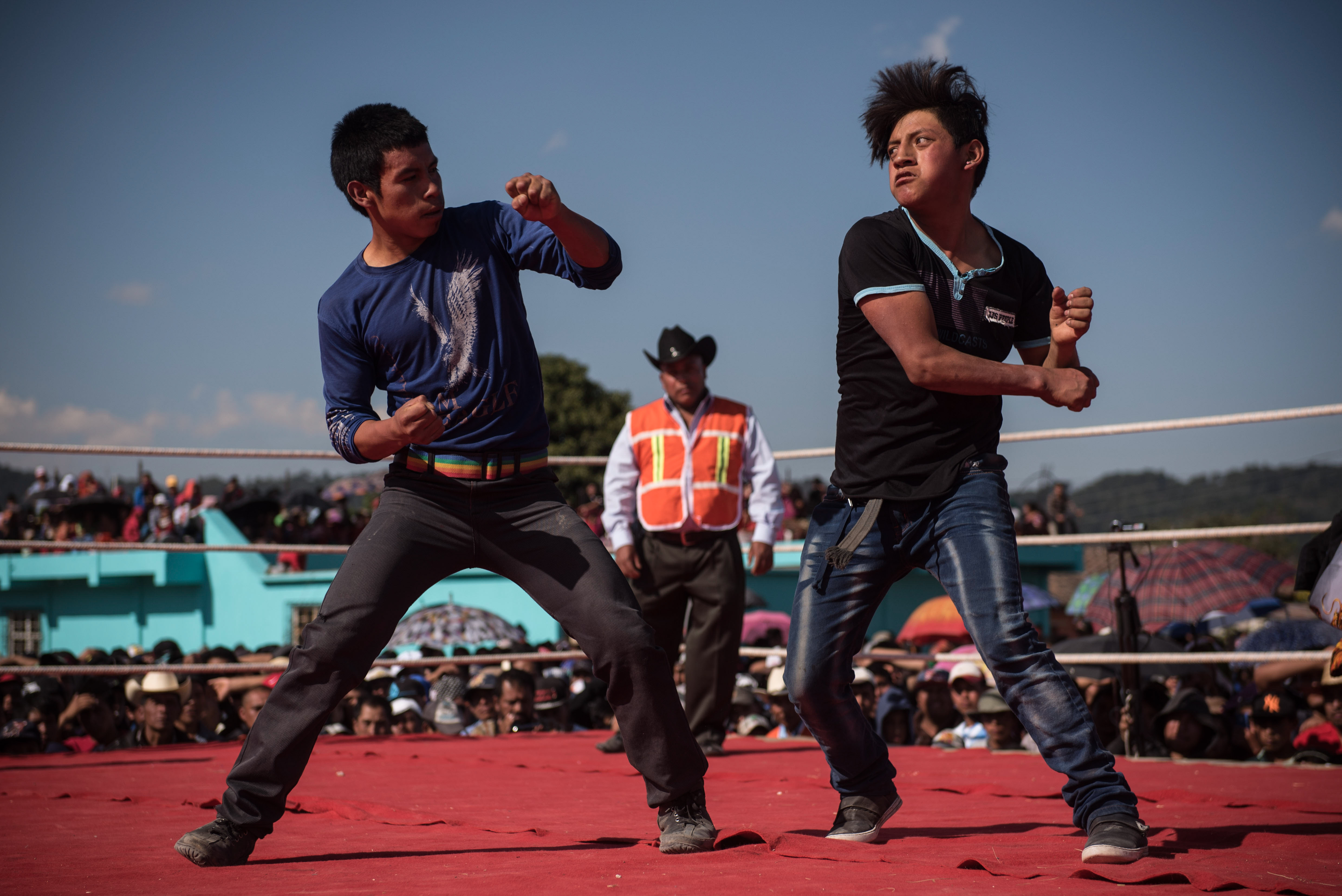
The festival takes place every year on Good Friday in the mountains north of Quetzaltenango, the second largest city in the country. Home to a variety of indigenous Mayan groups, the area is largely agricultural, and Chivarreto is no different in that regard. It is a curious place for other reasons, though.
Hearing rumors of the “Guatemalan boxing town,” you could be forgiven for thinking that you would find a sporting mecca in the highlands. The reality couldn’t be more different. In Chivarreto, home to 16,000 people, there are no boxing gyms and no professional boxers. The local appreciation for pugilism apparently only lasts for one day per year.
The rest of the time people get on with their lives, albeit in the shadow of a remarkable feature. On a mountainside above the town, a series of Hollywood-style letters spell out the name of the town. Each white letter is ten meters high, making them visible from the main highway to Mexico. It’s an incongruous sight in the agricultural highlands but one that has an interesting backstory of its own: the sign was paid for by migrant workers from Chivarreto who live in Los Angeles.
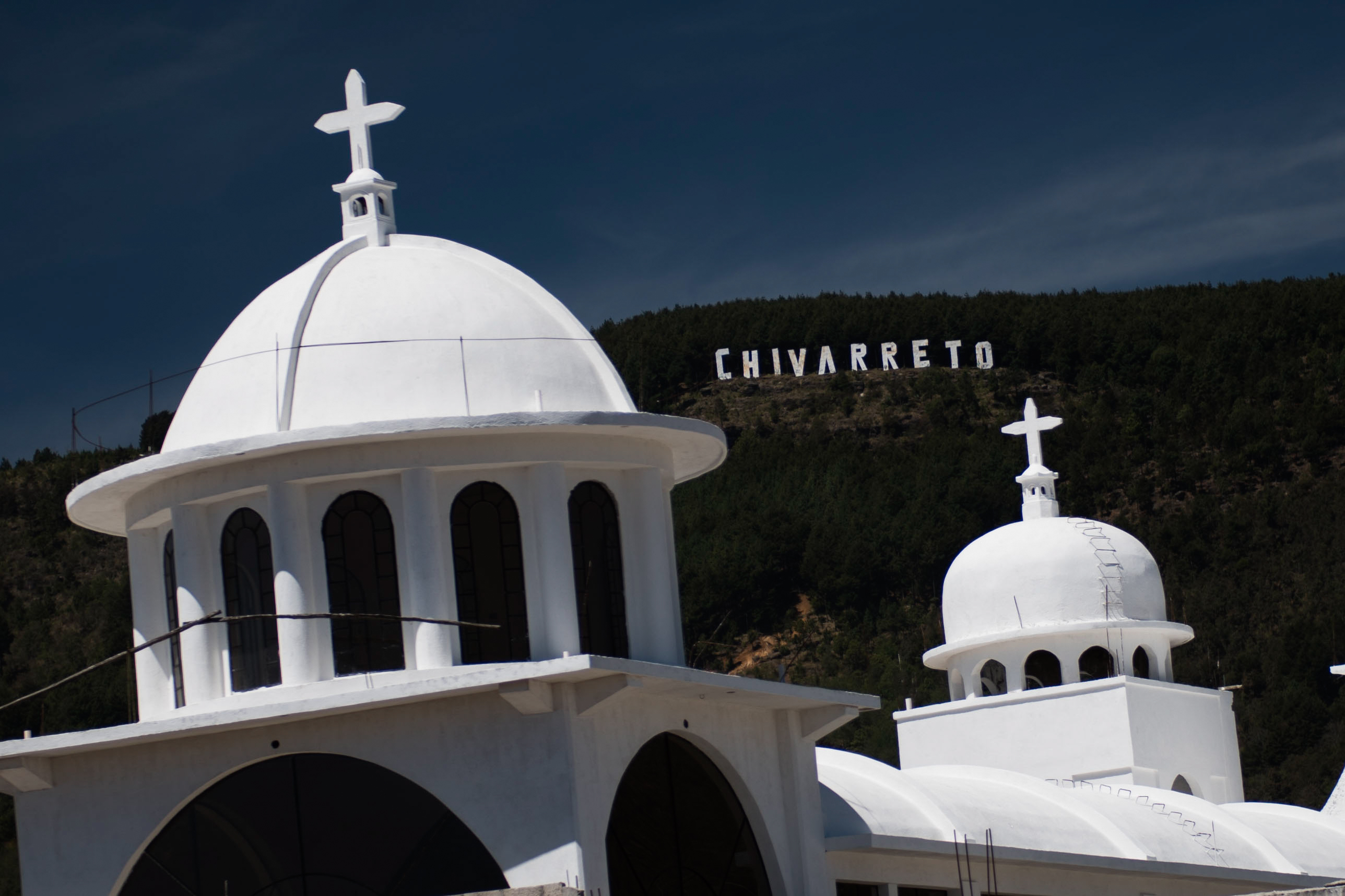
In fact, the connection between the Californian metropolis and the Guatemalan town is so strong the town mayor, Manuel Perez, estimates that around 60% of the working age population lives in the US. Not for nothing is Chivarreto known as “Little Hollywood.”
Gox is one of many who made the journey north to California, where he spent seven years working in construction. Recently deported, he is back home and eager to show off his prowess in an event that he first took part in at the tender age of 14. Still pumped from his convincing victory in the first fight, he is itching to get back into the ring. “No one here will beat me today,” he says, goading his opponents and showing off a cavalier resistance to the old saying that “pride comes before a fall.”
Plenty of other men, young and old, are equally set on testing their mettle in the oppressive afternoon heat. A steady trickle of people continue to arrive until the dusty soccer field is filled with thousands of people. Women in colorful traditional dress; older men in collared shirts and wide-brimmed hats; younger ones in baggy jeans and LA Dodgers caps, all crowding around the raised wooden ring. On one side, the men of Chivarreto. On the other, the men of Pasajoc, a nearby village.
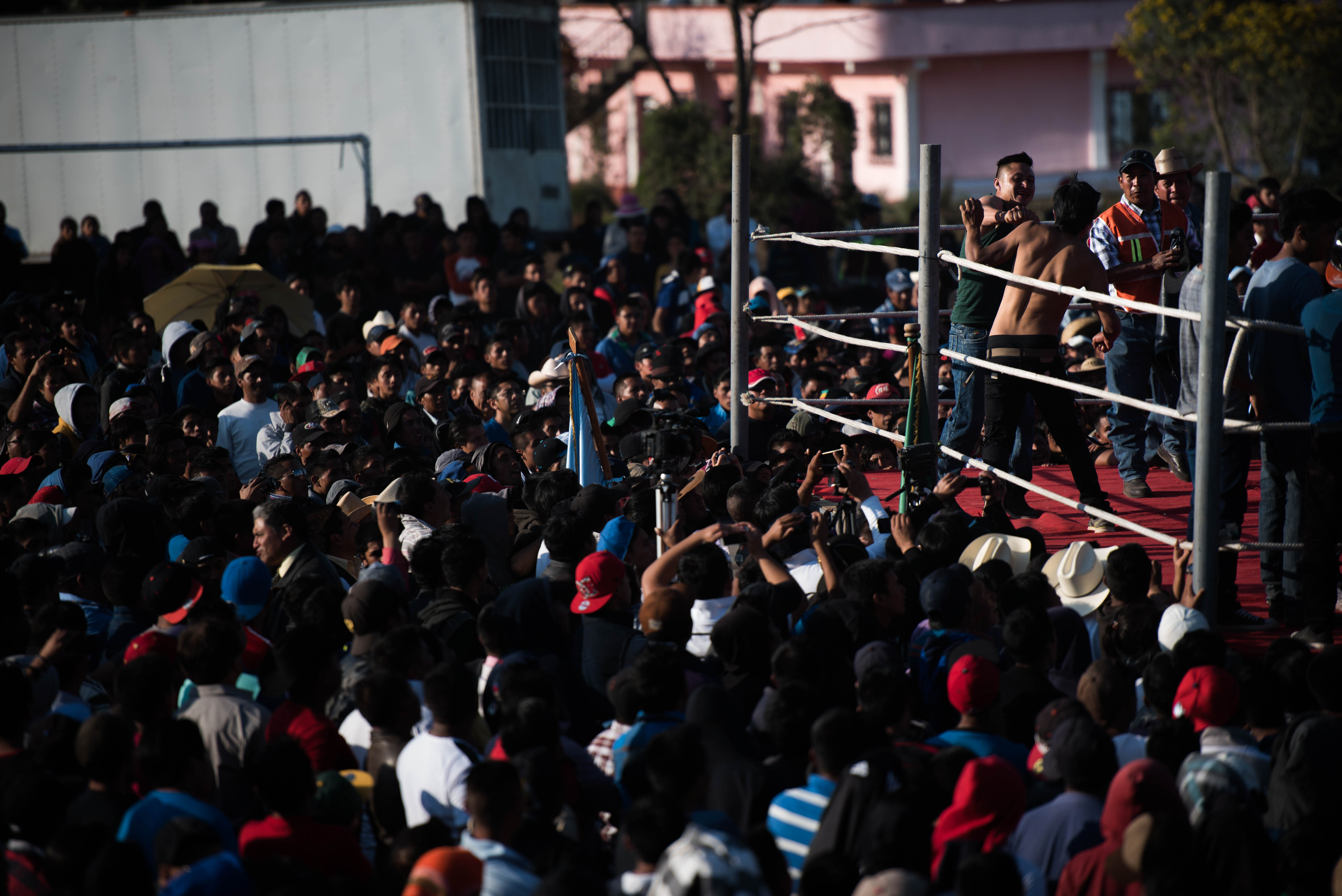
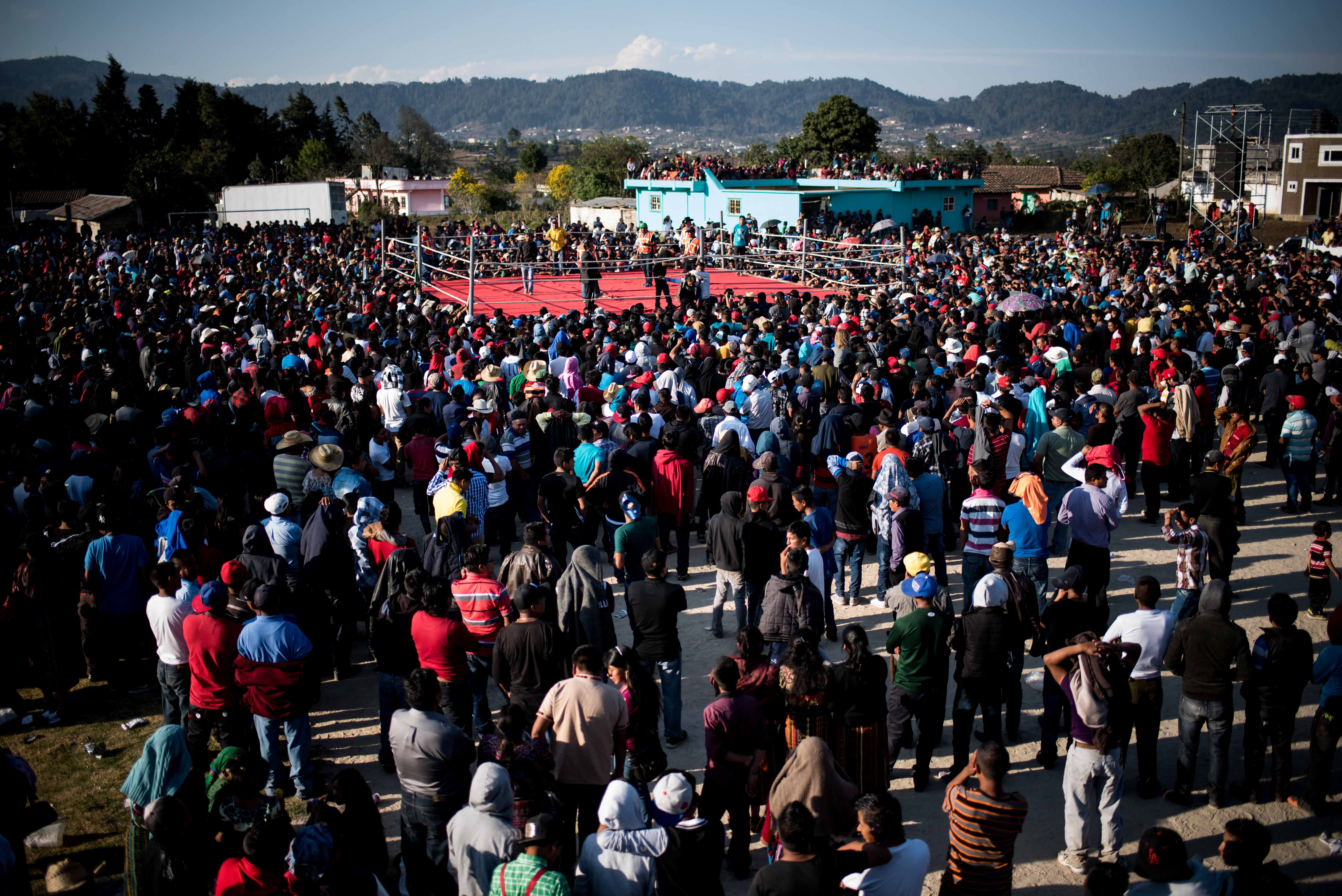
They may be set up like two opposing armies defending their territory, but no one really knows why the two villages come together to fight on Good Friday. Some say that the boxing is a form of penitence to mark the religious holiday, while others believe that it was originally a way of resolving disputes. These days it’s apparently just a bit of fun, a chance to see who is the toughest guy in town. Outsiders are even allowed to fight if they dare, but it’s mainly a local affair.
That said, not everyone in Chivarreto supports the tradition. After carrying a wooden cross through town to the Catholic church, worshippers listen to a sermon from the priest before filing out into the sun. Will they be heading to the soccer pitch to watch the boxing? A few of the teenagers shift their feet awkwardly, but one man sums up the prevailing mood. “Boxing has nothing to do with our religion,” he says. “We won’t be going near it.”
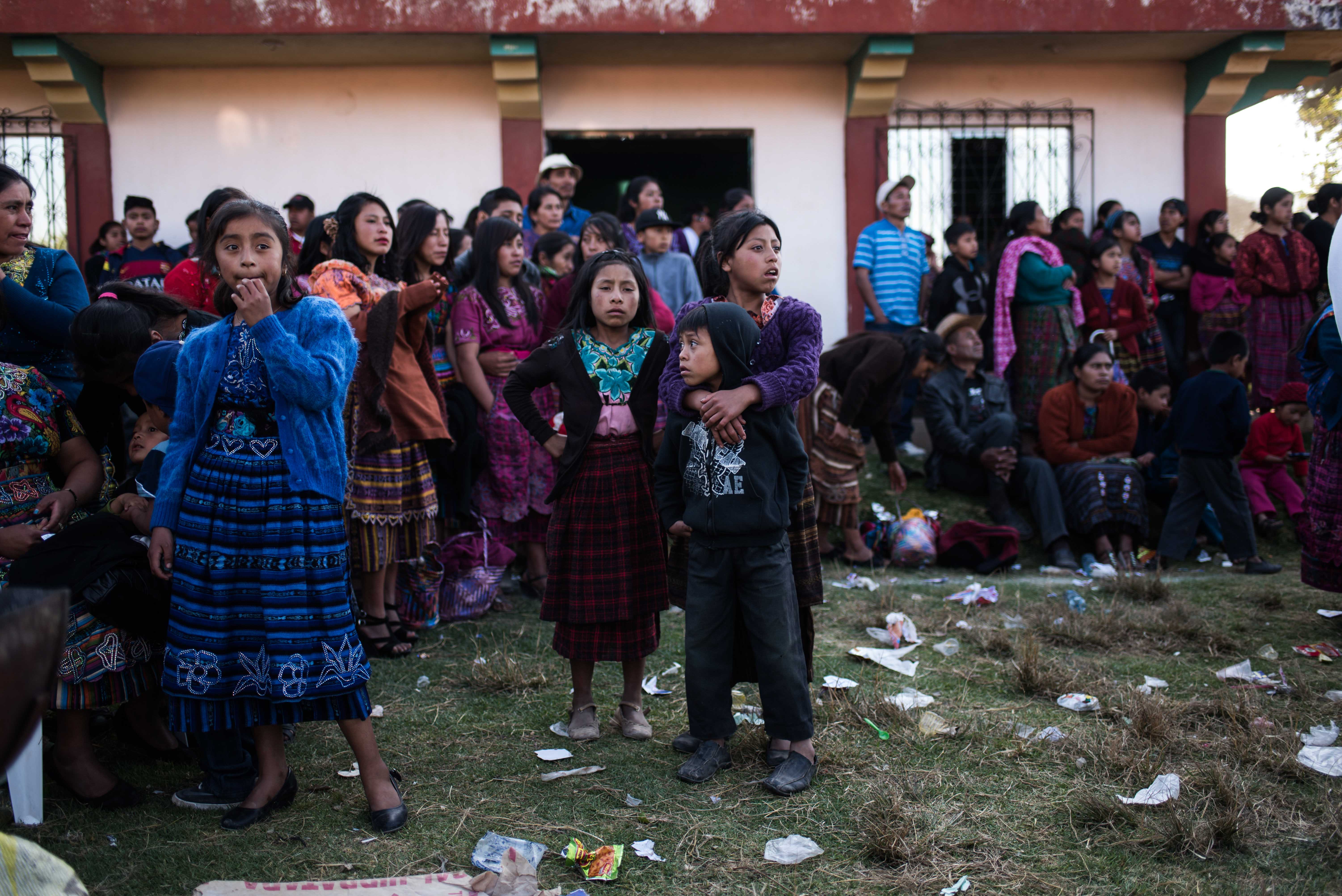
The mayor says that the fights used to run for three days in a series of villages in the area, but no one knows when the tradition began exactly. Most agree that it’s been at least 100 years since the first fights. “When my father was growing up, people were already fighting,” said 80-year-old Adolfo Chic Pop as he sipped a beer in the afternoon heat.
While the concept remains the same, there have been changes in recent years. Mayor Perez got into the ring 35 years ago, but now dedicates his time to organizing the event and making sure things run smoothly. He says that things have changed drastically. “For a start there never used to be a ring, that was bought in 2012 with money sent back by our brothers in Los Angeles,” he said. “Plus they pay for satellite TV and a camera so they can watch the fights at home in the US.”
Sure enough, there is a TV camera set up on a wooden tower a short distance from the ring, and the announcer does his best to make viewers feel that they are at home. “From Little Hollywood to the world,” he booms, “these are the best boxers Guatemala has to offer.”
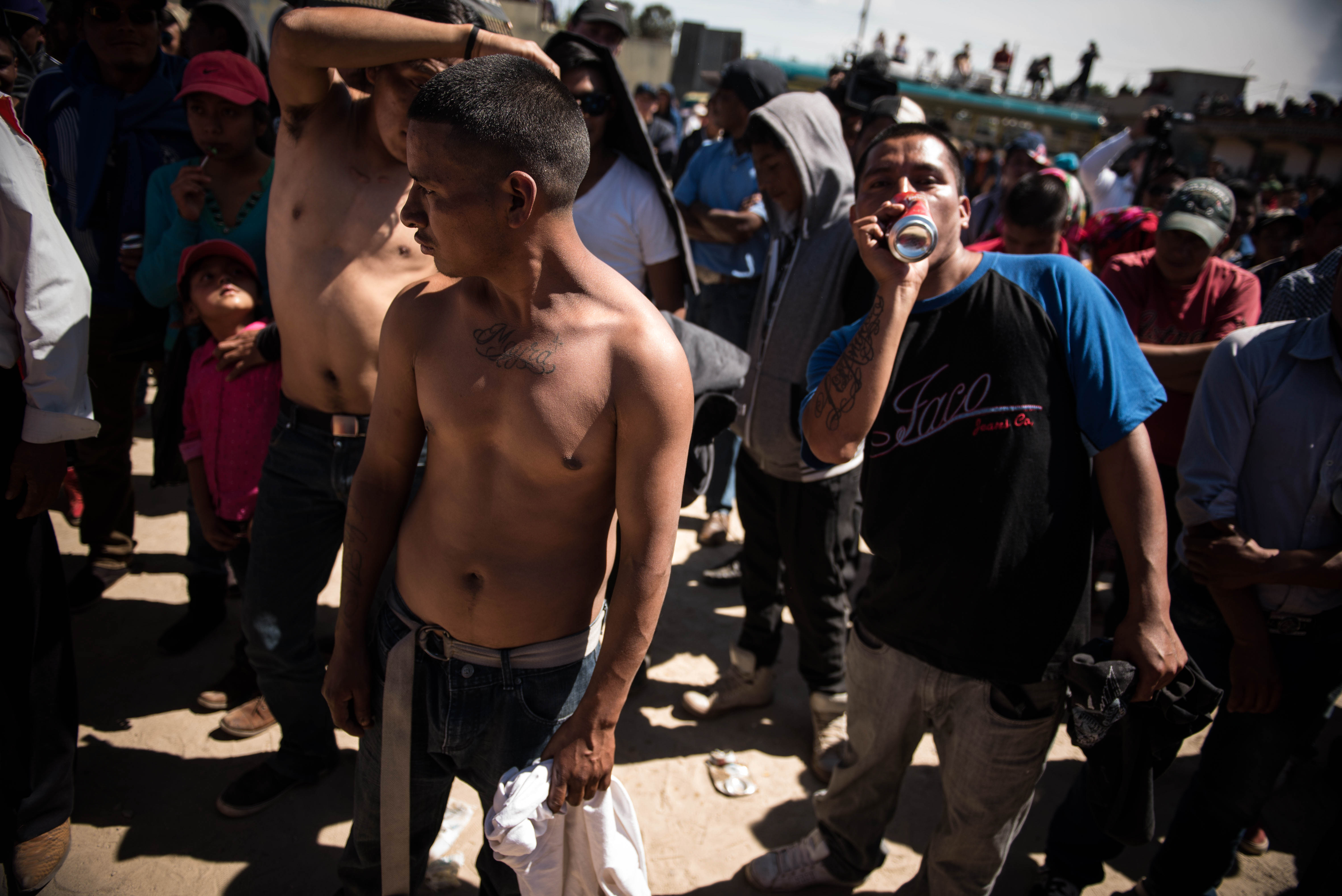
It soon becomes clear that his words are firmly tongue-in-cheek, but what the boxers lack in technical skill, they make up for in courage. Each time a fighter from Pasajoc enters the ring, he has to walk to the Chivarreto side to challenge an opponent of a similar size. Occasional abuse rains down on big guys who pick on smaller opponents, but every challenge can be rejected.
The insults fly, but there is no bad blood between the two groups. “The truth is that we all know each other,” says Gox. “We go to school together, work together, the fighting is just for fun.” As if to prove his point two bloodied fighters trade punches for what seems like an eternity before embracing in the middle of the ring. According to Gox, they’re cousins that happen to live in different villages.
On more than one occasion, a dislodged tooth drops to the floor, but no one rushes to pick them up.
Some of the fighters take beating after beating, returning to the ring despite broken noses and bleeding faces. On more than one occasion, a dislodged tooth drops to the floor, but no one rushes to pick them up.
While the fights look like an anarchical blur of windmilling arms and wobbly legs, they are in fact governed by a set of rules enforced by two referees. Only punches are allowed, no kicking, no grappling and no striking if your opponent falls down. If you do go down, you can forfeit the fight or get back up and carry on. For those frustrated by the cagey fighting style of boxers like Floyd Mayweather, Chivarreto is the perfect antidote; an endless stream of fighters throwing big shots without much thought for defense.
Men come and go, teeth are lost, noses are broken, but still Gox waits to be challenged once more. Perhaps put off by his strong performance in the first fight, no one wants to step into the ring with him. In the meantime, he chats to his brother Otto and some friends, passing around bottles of quetzalteca–a particularly potent Guatemalan aguardiente–and cheering the Chivarreto fighters on.
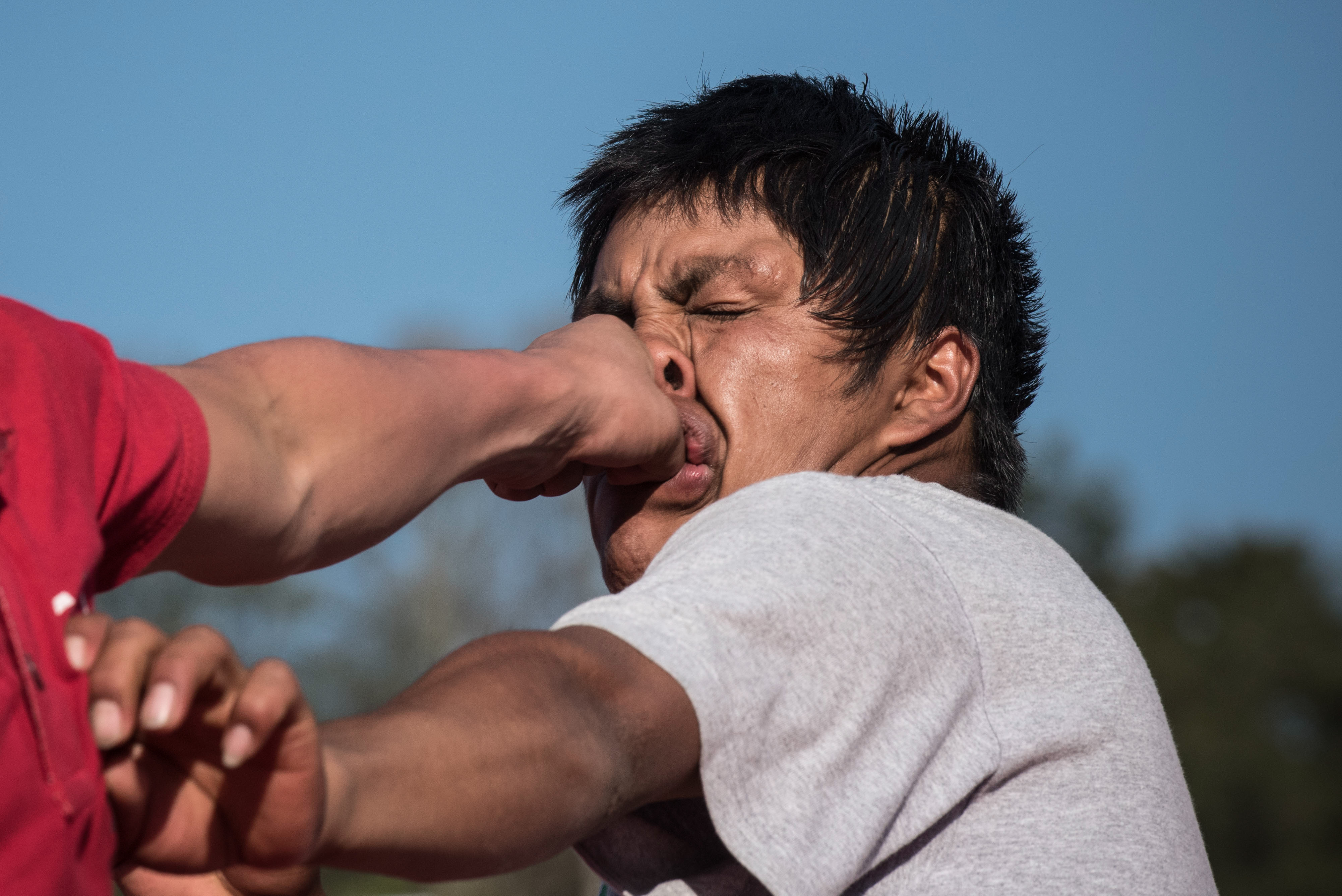
Shouts go up each time a punch is landed, and a roar greets every knockdown. For the winners, the descent into the crowd a glorious one, while the losers are consoled before leaving to nurse their wounds. Teenagers are pushed forward to get their first taste of the action, while old timers reminisce about past fights, leaving the younger men to it on this day.
Years ago, there would also be fights between children, but the practice brought unwanted attention from the Guatemalan authorities. Mayor Perez agreed to ban child fights so that the festival could continue. These days the children stay out of the ring, eating cotton candy and hotdogs from the sellers dotted around town. The mood is festive, and entire families enjoy a day off from work and school.
Only at ringside does the testosterone hang heavy in the air. Gox and his friends aren’t the only ones that started drinking early, and many of the fighters get considerably worse for wear as time goes on. The referees are meant to send anyone under the influence of alcohol away from the ring, but in reality, only a handful of the most jelly-legged drunks are rejected. At times, the officials struggle to maintain control as people flood the ring looking for their moment in the limelight.
In a town that sends so many people to the United States, the festival is also a powerful projection of identity.
Finally, Gox catches the eye of a rival and climbs back into the ring. His movements are slowed by the aguardiente, and the intense concentration of the first fight has been lost, replaced by the glassy stare of a man who has been looking at the bottom of a bottle. The first hit grazes off his cheek and knocks the black woolly hat from his head. The second, third and fourth punches all hit their mark. Gox is dazed and his nose becomes bloodied, but the strikes rouse him like a wounded animal. He tries to gather himself, but there will be no heroic comeback. As he staggers away, a trickle of blood runs from his nose. The self-proclaimed champion has been struck down.
Gox seems shocked in defeat, and vows to get back into the ring. But it’s not to be; the boxing, or maybe the alcohol, has gotten the better of him for this year. Although he wanted to prove himself in the ring, the truth is that, at Chivarreto, there are no winners or losers. In that respect, the fights aren’t sport at all, but more a proving ground for men to show that they will put their bodies on the line. In a town that sends so many people to the United States, the festival is also a powerful projection of identity, and one that neither the fighters nor those watching on TV in Los Angeles are prepared to leave behind.
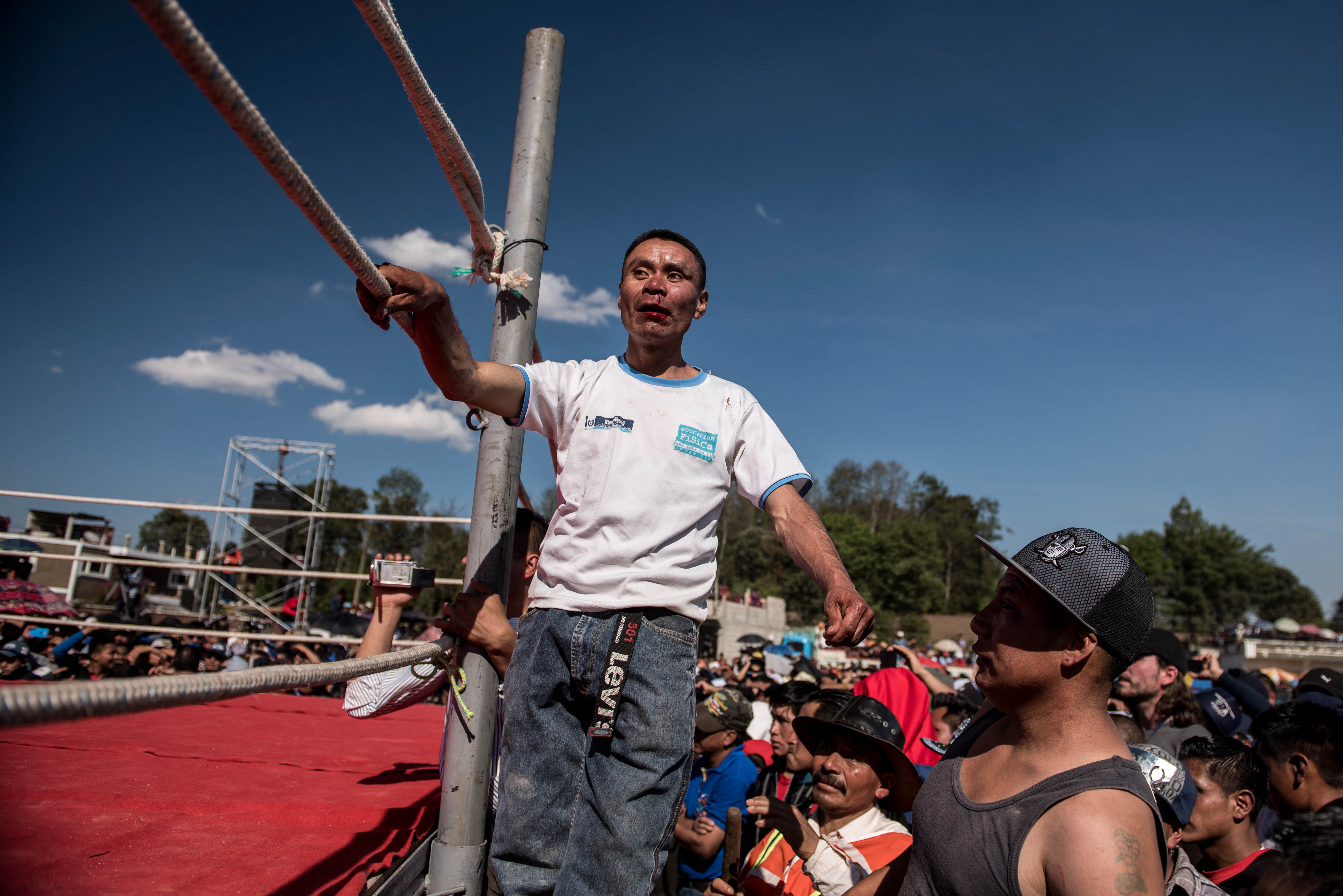
The conversation turns introspective as dusk gathers and the ring is left empty. “I stayed here to look after my Mum, and my brother’s money,” says Otto. “We are doing ok but everyone leaves to work.”
For his part, Gox is adjusting to the small town life that he left behind for the big city, and it doesn’t look like it’s easy. “I want to go back as soon as I can,” he says. “I’ve got a house and land here, but there is nothing for me to do.”
For the returning migrants, it’s tough settling back into Chivarreto, and the boxing provides a much-needed distraction. Win a fight or two, and your reputation will be boosted in the town, but for men like Gox, who came of age away from home, it feels like scant reward.







